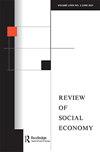特刊导言:欧洲的正义与团结
IF 1.2
Q2 ECONOMICS
引用次数: 0
摘要
欧洲各地的公众越来越认为,欧盟(EU)削弱了其成员国解决问题的能力,尤其是在社会、福利、移民和劳工政策方面,并加剧了其内部和内部的不平等。因此,许多人认为,整个欧盟及其内部的特定机构需要进行重大改革。这引发了各种问题:欧盟政策制定的哪些领域和哪些具体机构需要改革?什么样的评估标准应该指导我们制定替代方案?更抽象地说,哪些社会经济正义和团结原则(如果有的话)适用于欧盟层面,这些原则如何为政策和机构设计提案提供信息?多年来,关于欧盟的民主赤字,人们写了很多文章。但关于实质性(而非程序性)规范性标准的文章却少得多。更少的作者试图将实质性的道德分析与具体的、基于经验的政策建议结合起来。本期特刊的目标是弥补与欧盟有关的正义和公平理论的不足,并在弥合规范、哲学观点和实证分析之间的差距方面取得一些进展。为此,该问题将政治理论家和哲学家与政治学、社会学和政治经济学领域更有经验的研究人员进行对话,以批判性和建设性地分析欧盟的主要机构。就主题领域而言,所有这些文章都可以被认为是对调查欧盟不断演变的“经济宪法”的贡献。有时,这种参与是间接的,并且是在理论和哲学抽象的层面上发生的,比如当作者试图确定最佳解释时本文章由计算机程序翻译,如有差异,请以英文原文为准。
Introduction to the special issue: Justice and solidarity in Europe
Publics across Europe increasingly feel that the European Union (EU) undermines the problem-solving capacities of its member states – particularly in social, welfare, migration, and labour policy – and increases inequality both within and across them. As a result, the EU in general, and specific institutions within it, strike many as standing in need of significant reform. This raises various questions: Which areas of EU policymaking and which specific institutions need to be reformed? What standard of assessment should guide us in formulating alternatives? More abstractly, what principles of socio-economic justice and solidarity, if any, apply at the EU level and how can these principles inform policies and institutional design proposals? Over the years, much has been written on the democratic deficit of the EU. But much less has been written on substantive (as opposed to procedural) normative standards. Even fewer authors have sought to bring together substantive moral analysis with concrete, empirically grounded policy suggestions. The goal of this Special Issue is to remedy both the lack of theorizing of justice and fairness in relation to the EU, and tomake someheadway in bridging the gap between normative, philosophical perspectives, and empirical analysis. To this end, the issue puts into dialogue political theorists and philosophers with more empirically minded researchers working in political science, sociology, and political economy to critically and constructively analyse the EU’s major institutions. In terms of topic area, all these essays can be thought of as contributions to the investigation of the EU’s evolving ‘economic constitution’. Sometimes this engagement occurs indirectly and at a level of theoretical and philosophical abstraction, as when authors seek to determine the best interpretation
求助全文
通过发布文献求助,成功后即可免费获取论文全文。
去求助
来源期刊

REVIEW OF SOCIAL ECONOMY
ECONOMICS-
CiteScore
2.60
自引率
10.00%
发文量
18
期刊介绍:
For over sixty-five years, the Review of Social Economy has published high-quality peer-reviewed work on the many relationships between social values and economics. The field of social economics discusses how the economy and social justice relate, and what this implies for economic theory and policy. Papers published range from conceptual work on aligning economic institutions and policies with given ethical principles, to theoretical representations of individual behaviour that allow for both self-interested and "pro-social" motives, and to original empirical work on persistent social issues such as poverty, inequality, and discrimination.
 求助内容:
求助内容: 应助结果提醒方式:
应助结果提醒方式:


